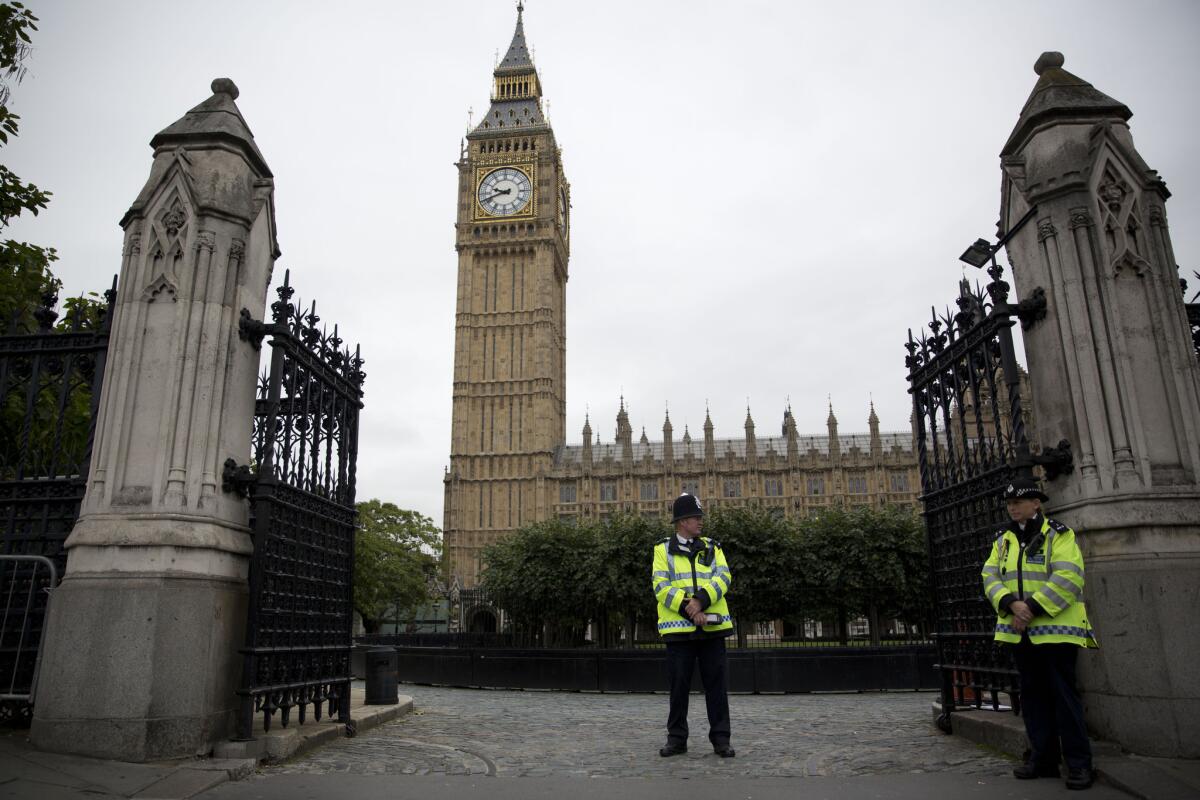Cameron proposes new anti-terrorism laws in Britain

- Share via
Reporting from London — British Prime Minister David Cameron proposed new counter-terrorism laws Monday that would make it easier for the government to seize the passports of suspected militants from Britain traveling to Syria and Iraq.
The proposed legislation would also tighten airline restrictions and make it easier for police to restrict the movements of terrorism suspects.
The announcement comes amid growing concern over British citizens who are fighting in Iraq and Syria with the Islamic State extremist group.
That fear that they could return to Britain to commit terrorist acts lies behind the proposed new powers that would make it easier for police and intelligence agencies to seize passports.
“It is abhorrent that people who declare their allegiance elsewhere are able to return to the United Kingdom and pose a threat to our national security,” Cameron said in remarks to Parliament. “Passports are not an automatic right.”
In many ways, the proposals bolster existing laws. The British government already has the power to revoke passports if it suspects a British national is planning to leave the United Kingdom to take part in terrorist activities.
The new proposals would make it easier to do so, particularly at the border.
However, it may prove more difficult to prevent suspects from reentering Britain. There has been discussion of stripping passports from British citizens who have already left the country, but the government has run into a range of political and legal obstacles, most notably the concern that it could leave some suspects stateless, which would contravene international laws to which Britain is a signatory.
During the parliamentary debate, a Conservative member of Parliament, Bill Cash, cited a provision in the United Nations’ Convention on the Reduction of Statelessness that could allow Britain to render a citizen stateless if he or she “declared allegiance to another state.”
However, Erin Marie Saltman of the Quilliam Foundation, a counter-extremism think tank, warned that such rhetoric risked granting Islamic State with a legitimacy it doesn’t deserve.
“We have to take a strong stance that we do not recognize Islamic State as a state,” she said. “They are a terrorist organization that have used terrorist means, violence and committed human rights crimes in order to establish a territory that they are ruling over. That does not give them any international right or credence to be considered a state by any valid body.”
Cameron said the details will continue to be negotiated within Britain’s coalition government and between its main political parties. The prime minister is reportedly at odds over the proposals with his coalition partner, Nick Clegg.
Clegg’s party, the Liberal Democrats, fears that some measures may violate civil rights.
The announcement also included measures that would force airlines to comply with tougher, legally binding rules.
“Airlines will have to comply with our no-fly-list arrangements, give us information on passenger lists, and comply with our security-screening requirements,” said Cameron, “If they do not do this, their flights will not be able to land in Britain.”
He also announced plans to give police and Britain’s intelligence agencies the power to impose greater restrictions on the movement of terrorism suspects within Britain. Under changes to so-called terrorism prevention and investigation measures, suspects could be excluded from entering certain buildings or areas, or moved to locations outside their communities.
This proposal was greeted with loud jeers in the House of Commons from the opposition Labor Party. It had already provided such powers under previous anti-terrorism legislation when it was in power, and the powers were subsequently abolished by the new coalition government in 2012.
The proposals come just days after Britain’s terrorism threat level was raised from “substantial” to “severe” on Friday.
Werth is a special correspondent.
More to Read
Sign up for Essential California
The most important California stories and recommendations in your inbox every morning.
You may occasionally receive promotional content from the Los Angeles Times.










